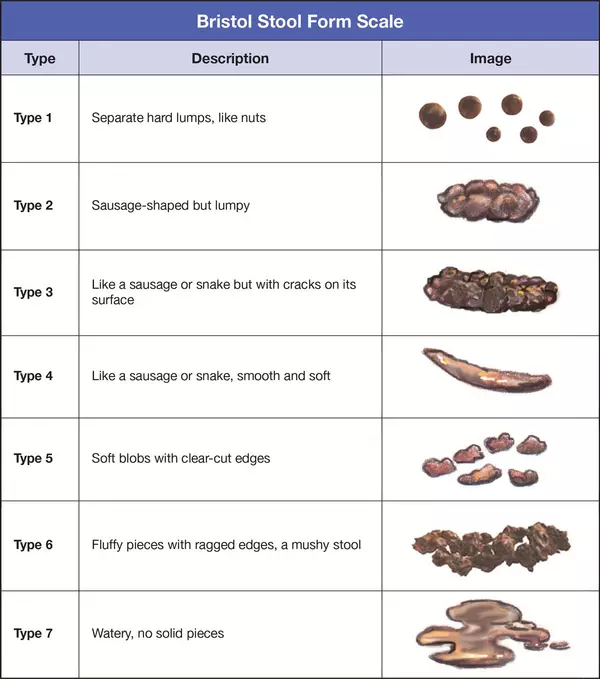
Gut health 101: Is your poop normal?
Go ahead, get your laughs out now. But the fact is: everyone poops, and what goes in, must come out. Inspecting the consistency of your stool is a great way to determine how well your bodily systems are working to absorb nutrients and eliminate waste. The Bristol Stool chart is a helpful tool that categorizes stool based on shape and consistency, and illustrates what's normal (or not) when it comes to your poop.

Courtesy National Institute of Health
Based on these illustrations: types 1 and 2 indicate constipation and types 6 and 7 indicate diarrhea. Therefore, normal stool consistency can range from type 3 to 5, with type 4 being the ideal bowel movement. Here are some things to consider if you're struggling with getting the right consistency:
- Eat more fiber. Adults should aim for 25-35 grams daily from fruits, vegetables, beans and legumes, nuts and whole grains.
- Drink more water. Normal stools depend on adequate water intake, so choose water as your primary beverage.
- Manage stress. Stress can cause constipation and/or diarrhea. Learning your triggers and managing your stress is important for normal stools.
- Exercise. Your intestinal tract is made of muscle tissue, so regular exercise will promote healthy bowels, too.
- Decrease your caffeine.
- Consider a taking a probiotic or eating fermented foods (sauerkraut, kefir, kimchee, pickled foods, tempeh, etc.).
- Watch for diarrhea-promoting food culprits: dairy, artificial sweeteners and fatty foods.
Keeping a daily record of food and fluid intake, along with a description of your bowel movements can help identify problems and potential solutions. Always call your primary care provider if the frequency and consistency of your stools concerns you.
Have you been screened for colon cancer?
FIT testing can save your life! FIT (Fecal Immunochemical Test) is an easy, reliable method to use for colon cancer screening. No special diet or test preparation—just a stool sample taken at home. Screening is important to help detect blood in your stool which can be associated with cancer. Ask your primary care provider about getting screened with FIT.
Related articles

Emplify Health by Bellin & Gundersen 2025 Wellness Draft

This new minimally invasive heart procedure is already saving lives

Surviving norovirus and how to recover quickly

How to stay active in the winter